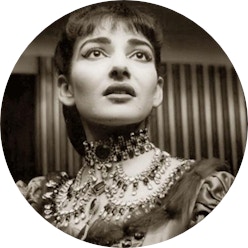
Мария Каллас
2 декабря 1923 г. - Нью-Йорк — 16 сентября 1977 г. - Париж
About
In the course of her meteoric career, Maria Callas managed to rewrite the rules of operatic singing, combining a unique, compelling tone with a staggering vocal technique and an uncanny ability to embody the tragic characters she played. Her ability to rise to every demand that composers such as Bellini and Donizetti placed on the voice kick-started the revival of their forgotten scores, and her work with producers such as Luchino Visconti brought a new commitment to dramatic values in the opera house. A glamorous appearance and lifestyle combined with much-publicized cancellations and rows generated a media frenzy and made Callas the epitome of the operatic diva.
- 1937: Moves to Greece, where she studies singing at the Athens Conservatory.
- 1940: Member of the Lyric Theatre company.
- 1947: La Gioconda at the Verona Festival. Afterwards some engagements in Italy.
- 1949: Causes a sensation when she takes over the role of Elvira in I puritani at short notice at La Fenice in Venice.
- 1949: Marries the wealthy Italian industrialist Giovanni Battista Meneghini, and over the next two years continues to consolidate her career in Italy and abroad.
- 1951–58: Her career is centred on La Scala, where she has her greatest triumphs.
- 1954: Loses about 30 kilos and begins to enter the spotlight as a glamorous and photogenic celebrity.
- 1959: Begins a liaison with the wealthy Greek shipping magnate Aristotle Onassis; she drastically curtails her stage appearances.
- 1964: Director Franco Zeffirelli persuades her to return to the stage in his productions of Tosca at Covent Garden and a few months later of Norma in Paris.
- 5 July 1965: Last appearance on the operatic stage with Tosca at the Royal Gala at Covent Garden.
- 1971–72: Teaches in a series of masterclasses at the Juilliard School in New York.
- 1973–74: World concert tour with the tenor Giuseppe di Stefano; last public performance, in Japan on 11 November 1974.

